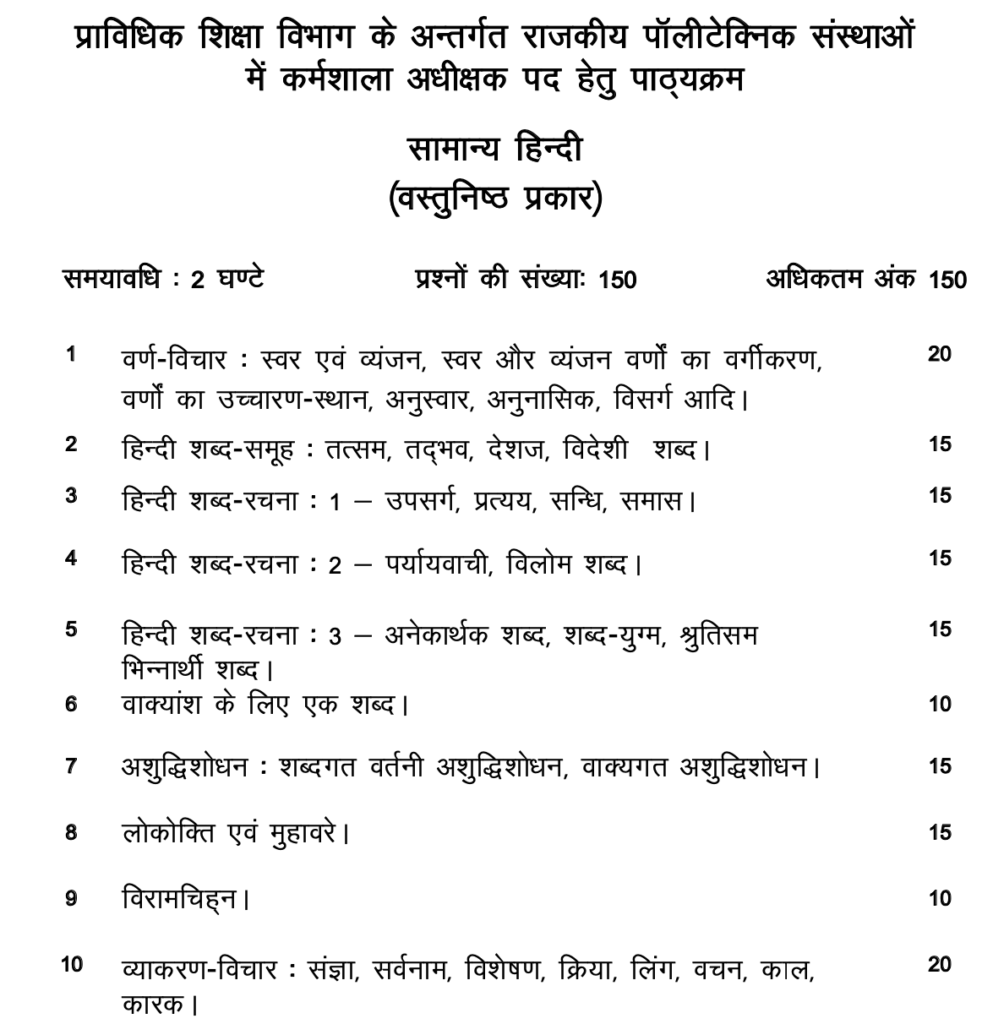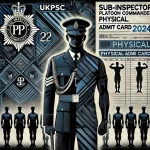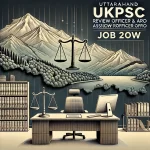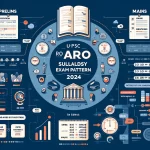The Uttarakhand Public Service Commission (UKPSC) has invited application on 09 posts of Workshop Superintendent in Government Polytechnic collages across the Uttarakhand State. The last date to fill its online application form ended on 12 July 2024.
However, the date of exam is still not clear in the official notification nor in the UKPSC exam calendar 2024-25. As per UKPSC exam trends, the exam is expected to be conducted in the month of September or early October.
If you have applied for workshop superintendent exam 2024 than you can start preparing for exam as we have published Uttarakhand workshop superintendent syllabus for written exam. We will post all the updates related to this exam on this page as they are posted on UKPSC official website.
Latest Update (10 October 2024): UKPSC will going to conduct written exam of Polytechnic Workshop Superintendent on 18th and 19th of January 2025. Applicants can download their admit card from 2nd week of January 2025.
Contents
Uttarakhand Workshop Superintended Syllabus 2024
Paper One (Hindi)

Paper Two (Mechanical Engineering Paper-I)
a) Statics: Equilibrium. Suspension cables. Friction. Principle of Virtual work.
b) Dynamics: Kinematics of rigid bodies- plane motion, absolute motion, relative motion, Kinetics of rigid bodies- plane motion, force, mass and acceleration, work and energy, impulse and momentum.
c) Theory of Machines: Velocity and acceleration of links. Cams, Gears and gear trains. Belt drives, brakes and dynamometers. Flywheel and governors. Balancing of rotating and reciprocation masses and multicylinder engines. Free, forced and damped vibrations. critical speed and whirling of shafts.
d) Mechanics of Solids: Stress and strain in two dimensions. Mohr’s circle. Stresses and deflections due to bending of beams. Unsymmetrical bending. Curved beams. Shrink fit. Stability of columns. Theories of failures.
PART -B
a) Material Science: Atomic structure, Crystal systems, Imperfections, Polymers Elastomers and Ceramics. Mechanical behaviour of Materials- Elastics and inelastic action, linear and non-linear elastic properties. True and conventional stress strain curves for common engineering materials. Strain hardening, Ductile and brittle transition, Fracture. Creep and Fatigue. Semi-conductors, super-conductors and ferrites. Magnetic and dielectric properties.
b) Manufacturing Science: Cutting Tools, Tools Geometry. Merchant’s theory, Taylor’s equation. Machinability. Unconventional machining methods including EDM, ECM and ultrasonic machining. Analysis of forming processes. High velocity forming, Explosive forming. Surface roughness, Callipers gauging, comparators. Angular Measurement. jigs and fixtures. Economics of tooling
c) Production Management: Work simplification, work sampling, value engineering, line balancing, work station design, storage space requirement. ABC analysis. Economic order, quantity including finite production rate, Graphical and simplex methods for linear programming, transportation model, elementary queuing theory. Quality control and its uses in product design. Use of X, R, P, (sigma) and C Charts. Single sampling plans, operating characteristics curves. Average sample size. Plant layout. Material Handling Devices. Production scheduling and scheduling problems.
Paper Three (Mechanical Engineering Paper-II)
PART -A
a) Thermodynamics: Application of the first and second laws of thermodynamics. Detailed analysis of thermodynamic cycles.
b) Fluid Mechanics: Reynolds transport theorem and its applications. Ideal fluid flow. Velocity distribution and resistance laws for laminar and turbulent flow in pipes. Isentropic flow and adiabatic flow.
c) Heat Transfer: Critical thickness of Isolation- Conduction in the presence of Heat sources and sinks, Heat transfer from fins. One dimensional unsteady conduction. Time constant for thermocouples. Momentum and energy equations for boundary layers on a flat plate. Dimensionless number. Nature of radiant heat. Stefan- Boltzmann law. Configuration factor. Natural and forced convection. IMTD heat exchanger effectiveness and number of transfer units.
PART -B
a) Energy Conversion: Combustion phenomenon in S.I. and C.I. engines. Hybrid and Electric Automobiles Modern carburation and fuel injection systems. Classification of hydraulic turbines, specific speed, Selection of turbines, Centrifugal pump, performance of compressor. Analysis of steam and gas turbines. High pressure boilers. Unconventional power systems. Utilization of solar energy.
b) Environment Engineering and Control: Vapour compression, Vapour absorption, steam jet and air refrigeration systems. Properties of important refrigerants. Psychrometric properties, psychrometric relations. Use of psychrometric chart. Estimation of cooling load, supply air conditions, sensible heat factor, Various types of pollutions and their Control.
Uttarakhand Workshop Superintendent Exam Pattern
| Subject | Questions | Marks | Time |
|---|---|---|---|
| Hindi
Paper-I |
150 | 150 | 2 Hours |
| Mechanical
Engineering Paper-II |
150 | 300 | 3 Hours |
| Mechanical
Engineering Paper-III |
150 | 300 | 3 Hours |
| Written Exam | 750 Marks | ||
| Interview | 75 Marks | ||
| Total Marks | 825 Marks |
Important Links
- Must Read: UKPSC RO ARO (Accounts) Recruitment 2024 & Vacancy Details
- Must Read: Uttarakhand ARO RO Syllabus 2024 UKPSC Samiksha Adhikari Exam Pattern [Advocate Gen. Office Nainital]
- Also Read: UKPSC Review Officer (RO) Syllabus 2024 (Uttarakhand State Election Commission)
- For Uttarakhand Latest Government Jobs:- https://4syllabus.in/tag/uttarakhand/
- For UKPSC Latest Updates & Notifications:- https://4syllabus.in/tag/ukpsc/
- UKPSC Official Exam Calendar 2024-2025:- UKPSC Exam Calendar 2024-2025
- Official Website: https://psc.uk.gov.in/





![Uttarakhand ARO RO Syllabus 2024 UKPSC Samiksha Adhikari Exam Pattern [Advocate Gen. Office Nainital]](https://4syllabus.in/wp-content/uploads/2024/09/Uttarakhand-ARO-RO-Syllabus-2024-UKPSC-Samiksha-Adhikari-Exam-Pattern-Advocate-Gen.-Office-Nainital-150x150.webp)
